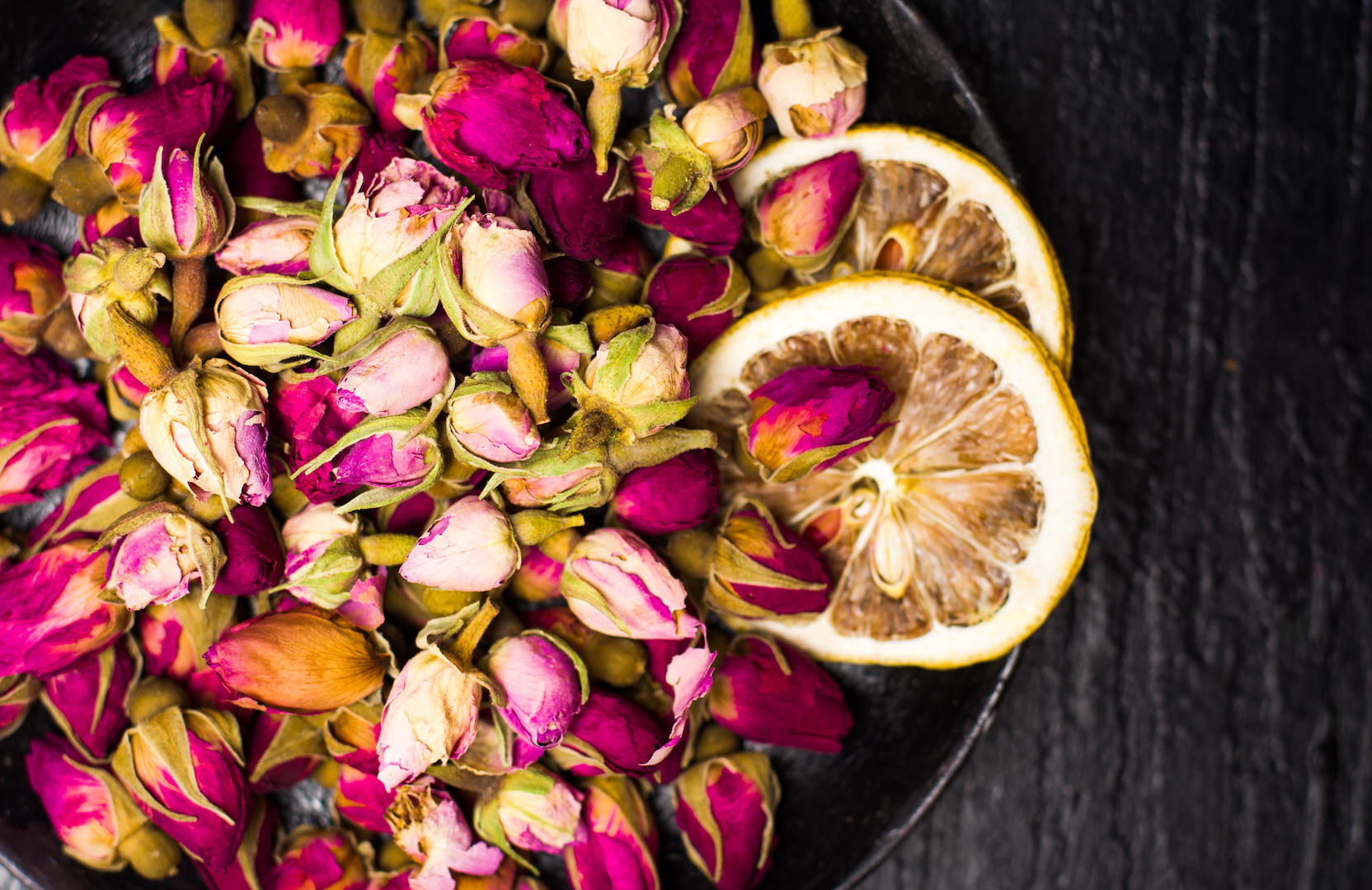Cara O. Frank, L.OM.
Valentine’s day has come and gone. But it got me thinking about the roses we use in Chinese herbal medicine.
Three roses that are commonly taught in Chinese herbal programs: Two are flowers, and one is a rosehip.
Méi Gui Huā 玫瑰花 Flos Rosae Rugosae rose flower
Perhaps the most beautiful herb that we have in our dispensary. Mei Gui Hua regulates Qi, it’s sweet, slightly bitter, warm, and enters the Liver and Spleen channels. The suggested doses are on the lower end: Dose 1.5-6 gms.
The Materia medica includes two citations, Harm and Benefit in Materia Medica (Bĕn Căo Hài Lì, 本草害利) by Ling Huan in 1893 and also Běn Cǎo Zhèng Yì Rectification of the Meaning of Materia Medica by 本草正義 Zhang Shan-Lei in 1914. However, I am unsure of the when and where it was first recorded.
It’s a Goldilocks herb: It moves qi, but it’s not excessively scattering, and it regulates blood without being excessively dispersing. It harmonizes the Liver, Spleen, and Stomach and regulates menses. It’s neither too hot nor too cold: It’s just right.
We use it for symptoms of liver- stomach disharmony: belching, flank pain, poor appetite. For this purpose, it would pair well with Fo Shou-Finger Citron, which can be difficult to source, or yu jin- Radix Curcumae. An herbal comparison might be Chai Hu Shu Gan Tang, which treats Liver-Stomach Disharmony.
Similarly, to Xiao Yao San– Free Wanderer Powder, Mei Gui Hua moves qi and blood to regulate the menses and alleviate breast distention and cramping symptoms.
Years ago, Dr. Huang Huang suggested making a tea with Mei Gui Hua and lemon to replicate the actions of Xiao Yao San. We think adding a little honey enhances that effect. In my practice, I like to modify Xiao Yao San with mei gui hua.
Dried buds of a pink tea rose closeup. Horizontal background. While no classic formulas include Mei Gui Hua, it’s a lovely herb to consider as a modifier to help manage a range of common gynecological complaints
Yuè Jì Huā 月季花 Flos Rosae Chinensis, Chinese rose flower
This flower looks almost identical to Mei Gui Hua. I have difficulty telling them apart!
Yue Ji Hua or Moon Season Flower is grouped with herbs that invigorate the blood. It is sweet and warm and enters the Liver channel. Its primary actions are to Invigorate blood, promotes the movement of Qi, reduce swelling, and resolve toxicity. The dose is also on the low-average side: 3-6 gms
The 3rd rose that we commonly use in Chinese Herbology is a rose hip:
Jīn Yīng Zĭ 金樱子 Fructus Rosae Laevigatae Cherokee rose fruit
Jin Ying Zi is grouped with medicinals that stabilize and bind.
Its properties are sour and astringent and neutral. It enters the Bladder, Kidney, and Large Intestine Channels.
The herb has a stabilizing effect on the lower burner. We use it to prevent leakages. Thus, it’s used to contain urine, slow diarrhea, and secure essence.
Of the three roses we’re discussing, this is the only one featured in classical formulas.
To stabilize the kidneys and secure essence, we might combine it with Qian Shi– Euryales Semen. This pair is featured in Shui Lu Er Xian Dan– Land and Water Two Immortals Elixir, which is actually just a dui yao containing both these medicinals. Qian Shi grows in the water while Jin Ying Zi grows on land, hence the formula name.
Other examples of how we might use it include combining it with Sang Piao Xiao Mantidis Ootheca for leaky urine- incontinence, nocturia, or enuresis. We also might combine it with Shan Yao Dioscoreae Rhizoma to bind the stool in the case of chronic diarrhea
Jin Ying Zi can be paired with kidney tonics such as Tu Si Zi Cuscutae Semen and Bu Gu Zhi Psoraleae Fructus for sperm loss due to kidney yang vacuity.
While writing this, I learned about three other roses, however I don’t have personal clinical experience with these.
The first is the root of the Chinese rose:
Yuè Jì Huā Gēn, 月季花根, Radix Rosae Chinensis
Yue Ji Hua gen is sweet and warm and enters the liver channel. Sweet, bitter, slightly astringent, warm.
It treats irregular menstruation, dysmenorrhea, amenorrhea, blood clotting, bruises, spermatorrhea, and vaginal discharge.
For the treatment of menstrual pain: we combine it with Yi Mu Cao– Leonuri Herba, Ji Guan Hua Celosiae Cristatae Flos and steamed eggs.
The dosage is 9-30g.
The second is Qiáng Wēi Gēn, 蔷薇根, Rosae Multiflorae Radix
Qiang wei gen is Bitter, Astringent, and cool. It enters the stomach and spleen channels. It clears heat, drains dampness, dispels wind, invigorates the blood and dispels toxins. It treats lung abscesses, dysentery, trauma, furuncles, and enuresis.
Finally, there’s Yě Qiáng Wēi Gēn, 野蔷薇根, Rosae Multiflorae Radix. This is the uncultivated Rosa Multiflora.
Ye qiang wei gen is Bitter, astringent and cool. It enters the Stomach and Large Intestine Channels. Its actions are to dispel wind and clear heat, kill parasites, promote tissue regeneration, astringe urine, and disperse blood stagnation. It’s used in formulas for abdominal pain, diarrhea, and bloody stool. It heals ulcers and treats infantile malnutrition due to parasites. It also treats scabies.
Ready to use roses to treat your patients? We stock them in raw and granule form. Hop online to our HerbScript Pro and build your custom formula today!
Cara Frank, L.OM., was raised in a health food store in Brooklyn, NY. When she was 8, she cartwheeled 5 miles from Greenwich Village through Soho and Chinatown and across the Brooklyn Bridge. For nearly 40 years, Cara has had the same crazy passion for Chinese medicine. At 17, she had her first acupuncture treatment. At 20, she enrolled in acupuncture school. In 1998 she went to China to study where she fell deeply in love with Chinese herbs. Since then, she has devoted her life to studying and teaching the topic.
Cara is the founder of Six Fishes Healing Arts and Six Fishes Neighborhood Acupuncture, both in Philadelphia, where she maintains a busy acupuncture practice and acts as the Head Fish of two warm and lively offices. She is the president of China Herb Company, a Chinese Herb Dispensary that provides classical and custom formulas to acupuncturists across the US. She has founded two Chinese Herb Departments and is the co-author of Case Studies: Eye, Ear, Nose and Throat Disorders published by Peoples Medical Publishing House. You can read her full bio or schedule an appointment.

